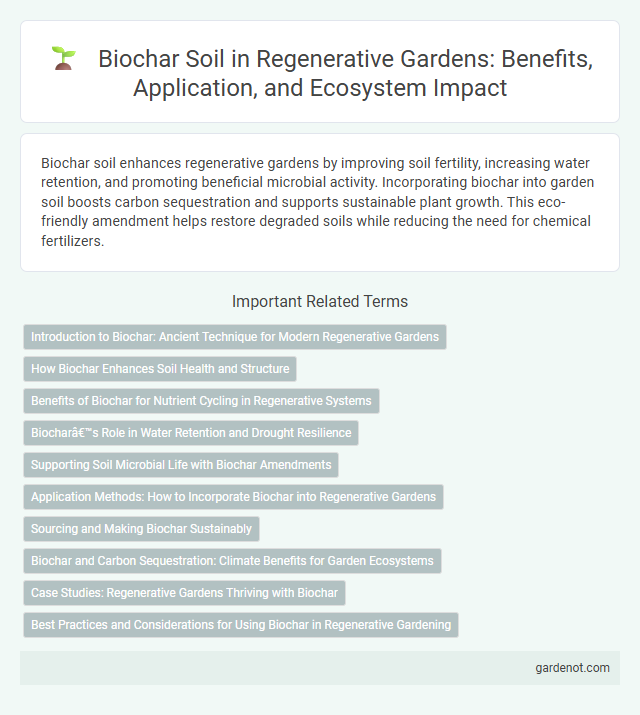Biochar soil enhances regenerative gardens by improving soil fertility, increasing water retention, and promoting beneficial microbial activity. Incorporating biochar into garden soil boosts carbon sequestration and supports sustainable plant growth. This eco-friendly amendment helps restore degraded soils while reducing the need for chemical fertilizers.
Introduction to Biochar: Ancient Technique for Modern Regenerative Gardens
Biochar is a highly porous charcoal produced through the pyrolysis of organic materials, enhancing soil fertility and carbon sequestration in regenerative gardens. This ancient technique improves soil structure, increases nutrient retention, and promotes beneficial microbial activity, making it integral to sustainable gardening practices. Modern regenerative gardens leverage biochar to restore degraded soils and boost plant health while mitigating climate change through long-term carbon storage.
How Biochar Enhances Soil Health and Structure
Biochar improves soil health by increasing nutrient retention and enhancing microbial activity, which promotes robust plant growth. Its porous structure boosts soil aeration and water retention, reducing erosion and compaction. Incorporating biochar into soil supports a balanced ecosystem, leading to sustainable fertility and resilience in regenerative gardens.
Benefits of Biochar for Nutrient Cycling in Regenerative Systems
Biochar enhances nutrient cycling in regenerative gardens by increasing soil cation exchange capacity, allowing for better retention and slow release of essential nutrients like nitrogen, phosphorus, and potassium. Its porous structure supports diverse microbial communities that facilitate nutrient transformation and improve soil fertility. These benefits lead to healthier plant growth and reduced need for synthetic fertilizers, promoting sustainable and resilient garden ecosystems.
Biochar’s Role in Water Retention and Drought Resilience
Biochar enhances soil structure by increasing porosity, which significantly improves water retention capacity in regenerative gardens. Its porous nature enables the soil to hold moisture longer, reducing the frequency of irrigation and supporting plant health during drought conditions. Integrating biochar into garden soil strengthens drought resilience, making it a critical component for sustainable water management and climate adaptation in regenerative agriculture.
Supporting Soil Microbial Life with Biochar Amendments
Biochar amendments enhance soil structure by providing microhabitats that support diverse microbial communities essential for nutrient cycling and plant health. Increased microbial activity in biochar-amended soils improves organic matter decomposition and nitrogen fixation, leading to sustained soil fertility. This symbiotic relationship between biochar and soil microbes boosts resilience against pathogens and environmental stressors in regenerative gardens.
Application Methods: How to Incorporate Biochar into Regenerative Gardens
Biochar can be incorporated into regenerative gardens by mixing it directly into the topsoil at a ratio of 5-10% by volume to enhance soil fertility and water retention. Pre-charging biochar with nutrients such as compost or manure before application improves its ability to retain and slowly release essential minerals to plants. Applying biochar in raised beds or garden rows promotes aeration and microbial activity, supporting healthy soil ecology and robust plant growth.
Sourcing and Making Biochar Sustainably
Sourcing biochar sustainably involves utilizing renewable biomass such as agricultural residues, forestry byproducts, and invasive plant species to minimize environmental impact. The production process prioritizes low-emission pyrolysis methods, capturing carbon while preserving soil health and promoting biodiversity. Implementing local sourcing reduces transportation carbon footprint and supports circular economy principles within regenerative gardening systems.
Biochar and Carbon Sequestration: Climate Benefits for Garden Ecosystems
Biochar enhances soil fertility by improving water retention, nutrient availability, and microbial activity, which supports healthier plant growth in regenerative gardens. Its porous structure traps carbon for centuries, serving as a stable form of carbon sequestration that reduces greenhouse gases in the atmosphere. Incorporating biochar into soil promotes long-term climate benefits by mitigating carbon emissions while enriching garden ecosystems.
Case Studies: Regenerative Gardens Thriving with Biochar
Case studies reveal that regenerative gardens utilizing biochar soil demonstrate significant improvements in soil fertility, water retention, and plant growth. Research from experimental plots shows biochar increases microbial diversity, leading to healthier, more resilient garden ecosystems. Successful implementations include urban community gardens and permaculture farms where biochar application reduced fertilizer dependency and boosted crop yields sustainably.
Best Practices and Considerations for Using Biochar in Regenerative Gardening
In regenerative gardening, applying biochar enhances soil fertility, water retention, and microbial activity by improving nutrient availability and structure. To maximize benefits, biochar should be charged or inoculated with compost or organic nutrients before incorporation to prevent nutrient drawdown. It's essential to balance the application rate, typically between 5-10% by volume of soil, and monitor pH changes to maintain optimal conditions for plant growth.
Biochar soil Infographic

 gardenot.com
gardenot.com